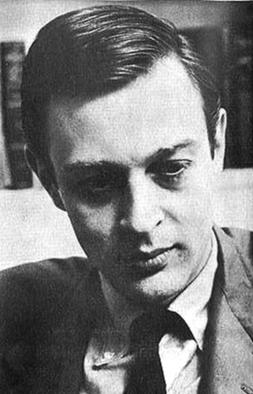Richard Yates (novelist) facts for kids
Quick facts for kids
Richard Yates
|
|
|---|---|

Yates in 1960
|
|
| Born | February 3, 1926 Yonkers, New York |
| Died | November 7, 1992 (aged 66) Birmingham, Alabama |
| Occupation | Novelist, short story writer |
| Literary movement | Realism |
Richard Yates (born February 3, 1926 – died November 7, 1992) was an American writer. He was known for his realistic stories about people's lives in the middle of the 20th century.
His first novel, Revolutionary Road, was a finalist for a big award called the National Book Award in 1962. His first collection of short stories, Eleven Kinds of Loneliness, was so good that people compared it to the famous writer James Joyce. Even though critics loved his writing, his books did not sell many copies during his lifetime.
After he passed away, more people became interested in his work. This happened partly because of an important essay written by Stewart O'Nan in 1999. Also, a book about his life was published in 2003 by Blake Bailey. In 2008, a movie based on his novel Revolutionary Road came out. It starred Kate Winslet and Leonardo DiCaprio and was nominated for an Academy Award.
Contents
About Richard Yates's Life
Richard Yates was born in Yonkers, New York. His parents divorced when he was only three years old. Because of this, he moved around a lot and lived in many different towns and homes during his childhood.
Early Interests and Military Service
Yates first became interested in writing and journalism when he went to Avon Old Farms School in Avon, Connecticut. After school, he joined the Army. He served in France and Germany during World War II. By the middle of 1946, he returned to New York.
His Career as a Writer and Teacher
When he came back to New York City, Yates worked as a journalist. He also worked as a ghostwriter, which means he wrote things for other people without getting credit. For a short time, he even wrote speeches for Robert F. Kennedy, who was a famous lawyer and politician.
His career as a novelist began in 1961 when his well-known book Revolutionary Road was published. He later taught writing at several universities. These included Columbia University, Boston University, and the University of Iowa Writer's Workshop.
Family and Later Life
In 1948, Richard Yates married Sheila Bryant. They had two daughters, Sharon and Monica, before they divorced in 1959. He married Martha Speer in 1968, and they had another daughter named Gina.
Richard Yates passed away on November 7, 1992, in Birmingham, Alabama. He died from a lung disease called emphysema and problems from a small surgery.
Richard Yates's Novels
Many of Yates's novels were based on his own life experiences. For example, the ages of characters in his books often matched his own age at certain times.
Famous Works and Recognition
His first novel, Revolutionary Road, was a finalist for the National Book Award. This was a big achievement. Other famous writers like Kurt Vonnegut and John Cheever admired his work. Yates's style of writing, called realism, showed life as it truly was. This style influenced other writers like Raymond Carver.
Even though critics praised his books, none of his novels sold more than 12,000 copies when they first came out. After he died, many of his books were hard to find. However, his reputation has grown a lot since then. Many of his novels have been printed again in new editions. This new interest started largely because of an essay by Stewart O'Nan in 1999.
The Revolutionary Road Film
With the renewed interest in Yates's life and work, a detailed book about him was published in 2003. In 2008, director Sam Mendes made a movie based on the novel Revolutionary Road. The film received many awards and nominations, including for BAFTAs, Golden Globes, and Academy Awards. When actress Kate Winslet won a Golden Globe for her role in the movie, she thanked Richard Yates for writing such a powerful story.
Richard Yates's Short Stories
Yates was also a well-known writer of short stories.
Eleven Kinds of Loneliness
His first collection of short stories was called Eleven Kinds of Loneliness. It came out one year after his novel Revolutionary Road. People often compared this collection to James Joyce's Dubliners, another famous book of short stories. Most of Yates's stories in this book take place in the boroughs of New York City. One writer praised how Yates showed the small joys and big difficulties of everyday people in these stories.
Liars in Love
Yates's second collection, Liars in Love, was published almost 20 years later, in 1981. It also received good reviews from critics. A writer for the New York Times said the stories were "wonderfully crafted" and stayed "alive and fresh" in one's memory.
Despite this praise, only one of Yates's short stories ever appeared in The New Yorker magazine. This happened after he had passed away. The story, "The Canal," was published in 2001 to celebrate the release of The Collected Stories of Richard Yates. This larger collection also received great reviews.
Filmography
- The Bridge at Remagen (screenplay) (1969)
- Lie Down in Darkness (unproduced screenplay) (1985)
- Revolutionary Road (2008)
See also
 In Spanish: Richard Yates para niños
In Spanish: Richard Yates para niños
 | John T. Biggers |
 | Thomas Blackshear |
 | Mark Bradford |
 | Beverly Buchanan |

